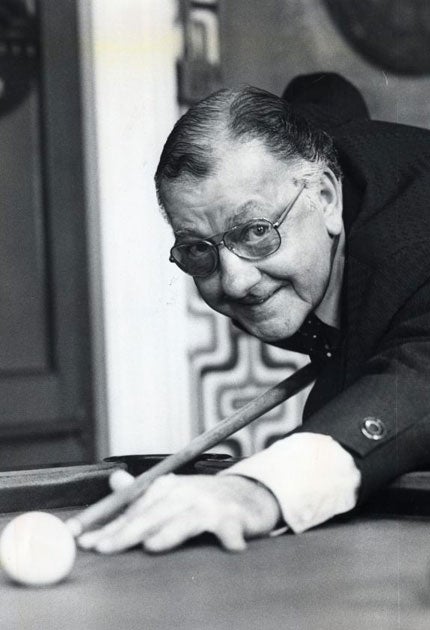Ted Lowe: ‘Whispering Ted’, the voice of snooker for half a century

The BBC television commentator Ted Lowe played a significant supporting role in one of the greatest yet most improbable sporting dramas, when on 28 April 1985, the snooker world championship culminated in the most nail-biting climax there had ever been or, to date, would ever be.
In the mid-1980s the sport was at its apogee of popularity thanks not least to Lowe himself, who had devised the BBC2 series Pot Black shortly after the introduction of colour television. And that 1985 final, between Steve Davis, the ruthlessly clinical Essex boy,already a three-times world champion, and the affable Ulsterman Dennis Taylor, with his idiosyncratic spectacles, would have gripped the public imagination even had it not boiled down, with the score standing at 17 frames apiece in a best-of-35 contest, to a black-ball finish.
Finally, at 23 minutes after midnight, more than an hour after the 35th and concluding frame had begun, Taylor potted the decisive black. His victory at the Crucible Theatre in Sheffield was watched on television by 18.5 million people, still the biggest post-midnight TV audience recorded in the United Kingdom. To put this into context, it was almost three times the late-night audience that in 2000 watched Steve Redgrave win his fifth Olympic gold medal. And finding the perfect words for an unprecedented occasion was Lowe, the former snooker hall manager from Berkshire. "I have never known an atmosphere like this," he murmured. "This is really unbelievable."
For television viewers, Lowe not only conveyed that sense of atmosphere, but helped to generate it. The hushed commentating style that had given him the nickname "Whispering Ted" had been cultivated by necessity, his inaugural commentary having taken place in 1946 at London's Leicester Square snooker hall, where Lowe was manager, broadcasting on radio only feet away from the two players. One of them was Joe Davis, the game's pre-eminent figure and, as a director of the Leicester Square venue, Lowe's boss as well as his hero. Anxious not to disturb the great man, or to be heard by the spectators, Lowe whispered into the BBC microphone. Afterwards, he was certain that he'd sounded terrible, yet the producer assured him he'd been marvellous. A career was born.
Like so many broadcasting careers around that time, it was born by accident. The illustrious Raymond Glendenning was meant to do the commentary that evening, but was indisposed. Accounts vary as to the reason why. Laryngitis is the generous explanation; a drink or two too many the more likely one. Either way, Lowe, a sociable fellow who enjoyed the odd tipple himself, stepped apprehensively but obligingly into the breach.
Born in 1920, Lowe was raised in Lambourn, where his father was head lad for the horse-racing trainer Ossis Bell (Lowe would later recall his father leading Bell's horse Felstead through the village following the 40-1 outsider's victory in the 1928 Derby). He started playing snooker as a schoolboy in his aunt's Lambourn pub, and became so proficient on the baize that when he later joined a new snooker club in south London, he made the local newspaper by beating Joe Davis, albeit with a four-black start.
Davis was there to open the place, and in fact it had been Lowe who, more in hope than expectation, had invited him. The evening would have lasting repercussions, for Davis was sufficiently impressed with the young man to recommend him as manager of the Leicester Square snooker hall.
Neither Davis nor Lowe could have imagined that the latter would end up being more influential than the former in the growth of snooker as a spectator sport, but that's what happened following a phone call in 1969 from one of the producers of BBC's Saturday afternoon sports show Grandstand, who asked Lowe if he could think of a way of capitalising on snooker's suitability for Britain's fledgling colour television facility. The result was Pot Black, which gave snooker a weekly platform, and established Lowe as its most familiar voice. Mindful, however, that not everybody had access to colour TV, he famously once said that for the benefit of "those of you watching in black and white, the pink is next to the green".
There were a few such gaffes, but on the whole he was an irreproachably safe pair of hands, and never committed the error of talking too much. Lowe would not have been comfortable with the BBC's coverage of the world championship that has just finished, with its non-stop commentary and endless analysis, not least by those old rivals Steve Davis and Dennis Taylor, and yet the game is forever indebted to him, hence the minute of warm applause with which the Crucible remembered him on Sunday at the start of this year's final between John Higgins and Judd Trump – a corker, but not as exciting as the epic of 1985.
Edwin Charles Ernest Lowe, snooker commentator: born Lambourn, Berkshire 1 November 1920; MBE 1995; married Jean (one son); died 1 May 2011.
Join our commenting forum
Join thought-provoking conversations, follow other Independent readers and see their replies
Comments
Bookmark popover
Removed from bookmarks